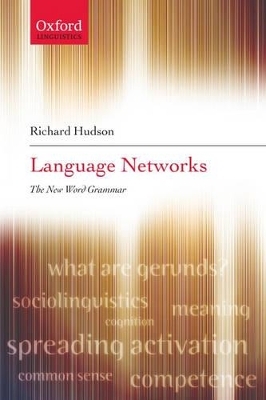
Language Networks
The New Word Grammar
Seiten
2006
Oxford University Press (Verlag)
978-0-19-926730-9 (ISBN)
Oxford University Press (Verlag)
978-0-19-926730-9 (ISBN)
Argues that language is a network of concepts which in turn is part of the general cognitive network of the mind. This book presents a theory of how we learn and use our knowledge of language, and puts this to work in a series of extended explorations of morphology, syntax, semantics, and sociolinguistics.
This book argues that language is a network of concepts which in turn is part of the general cognitive network of the mind. It challenges the widely-held view that language is an innate mental module with its own special internal organization. It shows that language has the same internal organization as other areas of knowledge such as social relations and action schemas, and reveals the rich links between linguistic elements and contextual categories.
Professor Hudson presents a new theory of how we learn and use our knowledge of language. He puts this to work in a series of extended explorations of morphology, syntax, semantics, and sociolinguistics. Every step of his argument and exposition is illustrated with examples, including the kind mainstream theory finds it hard to analyse. He introduces the latest version of his influential theory of Word Grammar and shows how it can be used to explain the operations of language and as a key to understanding the associated operations of the mind.
This book argues that language is a network of concepts which in turn is part of the general cognitive network of the mind. It challenges the widely-held view that language is an innate mental module with its own special internal organization. It shows that language has the same internal organization as other areas of knowledge such as social relations and action schemas, and reveals the rich links between linguistic elements and contextual categories.
Professor Hudson presents a new theory of how we learn and use our knowledge of language. He puts this to work in a series of extended explorations of morphology, syntax, semantics, and sociolinguistics. Every step of his argument and exposition is illustrated with examples, including the kind mainstream theory finds it hard to analyse. He introduces the latest version of his influential theory of Word Grammar and shows how it can be used to explain the operations of language and as a key to understanding the associated operations of the mind.
Richard Hudson spent all his working life researching and teaching linguistics at University College London. His School of Oriental and African Studies PhD project was a grammar of the Cushitic language Beja, and his subsequent work has focussed innovative and original work in linguistic theory, mostly with reference to Modern English. His previous books include Sociolinguistics (1980, second edition 1996), English Word Grammar (1990), Word Meaning (1995), and English Grammar (1998).
1. Introduction ; 2. Morphology ; 3. Syntax ; 4. Gerunds ; 5. Meaning: Semantics and Sociolinguistics ; References ; Index
| Erscheint lt. Verlag | 1.4.2007 |
|---|---|
| Zusatzinfo | numerous figures and tables |
| Verlagsort | Oxford |
| Sprache | englisch |
| Maße | 160 x 240 mm |
| Gewicht | 579 g |
| Themenwelt | Geisteswissenschaften ► Philosophie ► Sprachphilosophie |
| Geisteswissenschaften ► Psychologie ► Verhaltenstherapie | |
| Geisteswissenschaften ► Sprach- / Literaturwissenschaft ► Sprachwissenschaft | |
| ISBN-10 | 0-19-926730-8 / 0199267308 |
| ISBN-13 | 978-0-19-926730-9 / 9780199267309 |
| Zustand | Neuware |
| Haben Sie eine Frage zum Produkt? |
Mehr entdecken
aus dem Bereich
aus dem Bereich
Aspekte einer Ontologie des Logos
Buch | Hardcover (2024)
Springer Fachmedien (Verlag)
CHF 167,95
Wie die Menschheit zu ihrer größten Erfindung kam
Buch | Softcover (2022)
C.H.Beck (Verlag)
CHF 25,20
Macht und Legitimität politischer Sprache im Prozess der europäischen …
Buch | Softcover (2023)
Nomos (Verlag)
CHF 103,60


